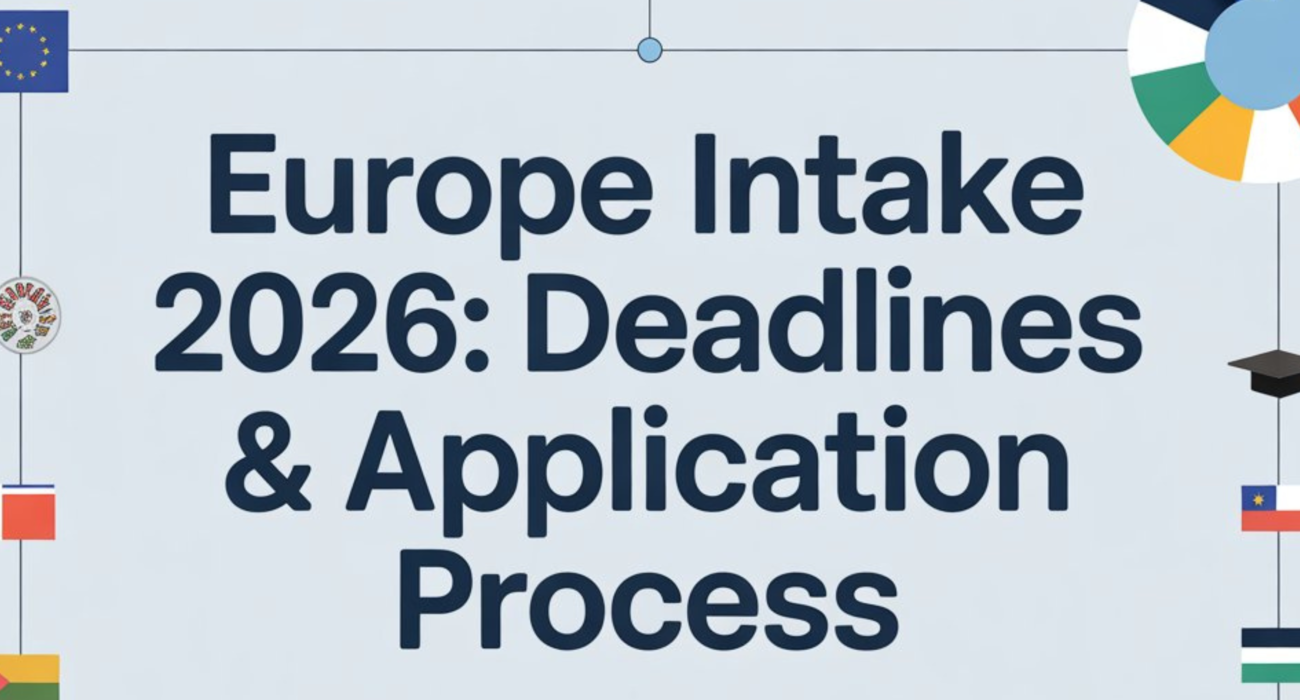Planning ahead for the Europe Intake 2026 is crucial for every international student aiming to study in top European universities. Europe remains one of the most sought-after destinations for higher education, with countries like Germany, the Netherlands, France, and Sweden attracting thousands of students each year. According to the European Commission, over 500,000 international students enroll in European universities annually, highlighting the competition and the need for early preparation.
Understanding application deadlines and procedures well in advance can make a significant difference. Many universities in Europe have rolling admissions or early deadlines, especially for popular programs in engineering, business, and medicine. Missing these deadlines could mean waiting another year, which not only delays your academic goals but also increases the cost of living and tuition expenses.
Early planning also gives students the advantage of arranging necessary documents such as transcripts, language proficiency certificates, and recommendation letters without last-minute stress. Additionally, it opens up opportunities to explore scholarships, financial aid, and internship programs that can significantly reduce study costs.
Starting early for the Europe Intake 2026 ensures a smoother application process, better chances of securing admission in preferred universities, and ample time to prepare for relocation. With the right strategy, students can confidently navigate the competitive landscape of European higher education and achieve their academic dreams with guidance from Genius Study Abroad.
Read More : Low-Cost Universities in Europe 2026 for International Students
Europe Intake 2026: Key Deadlines by Semester
Keeping track of application deadlines is one of the most critical steps when planning for the Europe Intake 2026. Each country and university may have different timelines, and missing a deadline can mean waiting an entire year. Here’s a clear breakdown of the key deadlines by semester for popular European destinations:
Autumn 2026 Intake (September 2026 Start)
- Germany: Most universities set the application deadline for the winter semester around July 15, 2026. Popular programs like Engineering, Computer Science, and Business fill up quickly, so early submission is advised.
- Denmark: For non-EU applicants, the deadline is January 15, 2026, while EU applicants have until March 1, 2026. Danish universities often require motivation letters and proof of language proficiency, so starting early is essential.
- France: The application platform opens in February 2026, with submissions accepted from February to March 2026. France’s Grandes Écoles and universities are highly competitive, making early preparation a necessity.
- Italy: The autumn semester deadline is September 1, 2025, especially for courses in Design, Arts, and Medicine. Early preparation allows time for visa processing and accommodation arrangements.
Spring 2026 Intake (February 2026 Start)
- Germany: Applications for the summer semester generally close by January 15, 2026. Students should ensure all academic transcripts and language certificates are ready.
- Portugal: The spring semester deadline is January 13, 2026. Portugal’s universities, particularly in Lisbon and Porto, attract many international students for business and technology programs.
- Netherlands: Non-EU applicants must apply by December 15, 2025, while EU applicants have until January 15, 2026. Dutch universities often have numerus fixus programs (limited seats), making early application crucial.
Summer 2026 Intake
- Germany: Summer semester starts in April 2026, with the application deadline for non-EU students typically December 15, 2025. This intake is ideal for students who missed the winter semester.
- Italy: Summer semester applications close on January 27, 2026, giving students sufficient time to prepare documents and plan their move.
By understanding and adhering to these deadlines, students can maximize their chances of admission for the Europe Intake 2026 and plan a smooth transition to studying abroad. Strategic planning also allows time to explore scholarships, accommodation, and part-time work opportunities, ensuring a well-rounded study experience with support from Genius Study Abroad.
Read More : Best Countries to Study in Europe for Indian Students 2026
Europe Intake 2026: Step-by-Step Application Process

Navigating the application process for the Europe Intake 2026 can feel overwhelming, but breaking it into clear steps makes it manageable and increases your chances of success. Here’s a comprehensive guide:
Step 1: Research and Shortlist Universities
Start by identifying universities that offer programs aligned with your field of study. Consider essential factors like location, language of instruction, program duration, and career opportunities after graduation. For example, Germany is popular for engineering and technology, while France is renowned for arts and business programs. Making a shortlist early allows you to target universities with deadlines that fit your timeline.
Step 2: Prepare Required Documents
Having all documents ready before submission is crucial. Typical requirements include:
- Academic transcripts and certificates from previous education.
- Proof of language proficiency, such as IELTS or TOEFL scores.
- Curriculum Vitae (CV) or Resume, highlighting academic achievements and relevant experience.
- Motivation letter or Statement of Purpose, explaining why you chose the program and how it aligns with your goals.
- Letters of recommendation from professors or employers.
- Passport copy with at least 6 months’ validity.
Preparing these documents early for the Europe Intake 2026 ensures that you are not rushed near deadlines and improves the quality of your application.
Step 3: Submit Applications
Applications are usually submitted through the university’s official portal. Double-check that all documents are uploaded correctly and that you meet specific requirements such as format, word limits, or notarization. Errors or missing documents can delay the process or lead to rejection.
Step 4: Attend Interviews or Assessments (if applicable)
Some programs, particularly in business, medicine, or arts, may require interviews, portfolio submissions, or additional assessments. Prepare thoroughly by practicing common questions, understanding your program, and demonstrating your motivation and skills.
Step 5: Await Admission Decision
After submission, universities typically communicate decisions within a few weeks to several months. During this waiting period, it’s important to stay organized, follow up politely if needed, and keep track of multiple applications.
Step 6: Apply for Student Visa
Once admitted, apply for your student visa well in advance. Visa requirements vary by country, so ensure you have all necessary documents like acceptance letters, financial proof, and health insurance. Delays in visa processing can affect your Europe Intake 2026 timeline, so early action is crucial.
Step 7: Finalize Enrollment
After securing your visa, complete enrollment by paying tuition fees or deposits, registering for courses, and attending orientation sessions. Preparing for relocation, accommodation, and local registration in advance ensures a smooth transition to student life in Europe.
Following these steps carefully enhances your chances of a successful and stress-free application for the Europe Intake 2026, and expert guidance from Genius Study Abroad can help you every step of the way.
Read More : Europe Student Visa fee 2026: Requirements, Fees & Application Guide
Scholarships and Financial Aid for Europe Intake 2026

Financing your education is a key part of planning for the Europe Intake 2026, and Europe offers a wide range of scholarships and financial aid options for international students. Leveraging these opportunities can significantly reduce tuition costs and make studying abroad more accessible.
- DAAD Scholarships (Germany)
The German Academic Exchange Service (DAAD) provides numerous scholarships for international students pursuing undergraduate, graduate, and doctoral programs. For example, in 2024, DAAD awarded over 15,000 scholarships globally. These scholarships often cover tuition, monthly stipends, health insurance, and travel costs, making Germany a cost-effective destination for high-quality education. - Erasmus Mundus Scholarships
The Erasmus Mundus program funds joint master’s programs across European universities. Students selected for these scholarships receive full tuition coverage, travel allowances, and living expenses. In 2023, more than 3,000 international students benefited from Erasmus Mundus scholarships, making it one of the most prestigious funding options for European study programs. - Campus France Scholarships
For students aiming to study in France, Campus France offers scholarships for international students at undergraduate and postgraduate levels. These scholarships may cover tuition fees partially or fully, along with living expenses. Programs like the Eiffel Excellence Scholarship provide financial support specifically for high-achieving students in engineering, economics, and law. - University-specific Scholarships
Many European universities also offer their own merit-based or need-based scholarships. For instance, KU Leuven in Belgium, Uppsala University in Sweden, and Technical University of Munich in Germany have dedicated funding for international students. Checking each university’s official website is crucial, as application processes and deadlines differ.
Applying early and combining multiple scholarship options can make your Europe Intake 2026 financially manageable while allowing you to focus on academics and career growth. With personalized guidance from Genius Study Abroad, students can identify the best scholarships, prepare strong applications, and maximize their chances of funding success.
Read More : Study in Europe 2026: Top Universities, Courses & Scholarships
Visa Requirements for Non-EU Students for Europe Intake 2026
Securing a student visa is a crucial step for non-EU students planning for the Europe Intake 2026. Each country has specific requirements and timelines, so understanding them early can prevent delays and stress.
Germany
Non-EU students must apply for a German student visa as soon as they receive their admission letter. The process typically includes submitting proof of admission, financial resources (around €11,208 per year in a blocked account), health insurance, and academic documents. Visa processing can take 6–12 weeks, so early application is essential to avoid missing the start of the semester.
France
For France, the student visa application begins after admission confirmation. Students need to provide an acceptance letter, proof of sufficient funds (minimum €615 per month), health insurance, and accommodation details. The French consulate recommends applying at least 3 months before your planned travel to ensure timely processing for the Europe Intake 2026.
Italy
Italian student visas should be initiated well before the semester start date, as processing can take up to 90 days. Required documents include university acceptance, proof of financial means (approximately €450 per month), health insurance, and a valid passport. Students are advised to schedule an appointment at the Italian consulate as soon as they receive their admission letter.
Careful planning and timely submission of visa applications are key to a smooth transition to studying in Europe. Guidance from Genius Study Abroad can help students navigate country-specific requirements, ensuring all documents are complete and deadlines are met for a successful Europe Intake 2026.
Read More : Best Consultancy in India for Abroad Studies | Top Study Abroad Experts 2025
Preparing for Life in Europe for Europe Intake 2026
Getting ready to move abroad is more than just packing your bags—it’s about preparing for a smooth transition to student life in Europe. For the Europe Intake 2026, planning ahead in key areas can make a big difference in settling in comfortably.
Accommodation
Securing housing early is crucial, as popular university cities like Munich, Paris, or Amsterdam experience high demand. According to a 2024 report, over 60% of international students in Europe struggle to find affordable on-campus housing if they delay their search. Options include university dormitories, shared apartments, or private rentals. Start your search months before arrival to compare prices, locations, and amenities.
Health Insurance
Most European countries require students to have valid health insurance. For instance, Germany mandates public or private insurance for all students, while Italy and France require proof of coverage for visa approval. Early enrollment ensures you are protected from unexpected medical expenses and helps in visa processing.
Cultural Adjustment
Adjusting to a new culture can be both exciting and challenging. Familiarizing yourself with local customs, social etiquette, and academic expectations can reduce culture shock. Participating in online student forums or attending pre-departure orientations helps you understand everyday life, from grocery shopping to classroom interactions.
Language Skills
Even if your program is in English, learning basic local language skills enhances daily life and social interactions. For example, knowing French phrases in Paris or German greetings in Berlin can make a significant difference in your comfort and confidence. Many students also take online or short-term language courses before departure to improve communication.
By planning for accommodation, health coverage, cultural adaptation, and language skills early, students can enjoy a seamless transition to Europe and make the most of their Europe Intake 2026 experience. Expert guidance from Genius Study Abroad ensures you are fully prepared for this exciting journey.
Tips for a Successful Application for Europe Intake 2026

Securing admission for the Europe Intake 2026 requires strategic planning, attention to detail, and a clear focus on your goals. Here are some actionable tips to enhance your application:
1. Start Early
Begin your application process well in advance. Early preparation allows ample time to research universities, gather documents, and meet language or standardized test requirements. For competitive programs in countries like Germany or France, starting 6–12 months before deadlines significantly increases your chances of acceptance.
2. Stay Organized
Keep a detailed checklist of deadlines, required documents, and application portals. Using spreadsheets or task management apps can help you track multiple applications simultaneously, ensuring that no document is missed and that each submission meets university-specific requirements.
3. Seek Guidance
Consulting with academic advisors or education consultants can provide valuable insights into the application process, scholarship opportunities, and visa requirements. Professional guidance from experts like Genius Study Abroad helps students avoid common pitfalls and strengthen their applications.
4. Be Authentic
Your motivation letter or Statement of Purpose should genuinely reflect your academic interests, career aspirations, and reasons for choosing a particular university or program. Authenticity resonates with admission committees and can set your application apart from others.
Following these tips ensures that your application for the Europe Intake 2026 is not only complete but also compelling, maximizing your chances of securing admission and setting the stage for a successful study abroad experience.
Conclusion
Planning early is the cornerstone of a successful journey to study in Europe. The Europe Intake 2026 offers exciting opportunities, but competition is high, and deadlines vary across countries and programs. By understanding the application process, preparing documents in advance, exploring scholarships, and arranging visas and accommodation, students can ensure a smooth transition to European universities.
Taking proactive steps—starting research early, staying organized, seeking expert guidance, and presenting an authentic application—can make all the difference. With careful planning, students can not only secure admission but also make the most of their academic and cultural experience in Europe.
For personalized support and expert guidance throughout every step of your Europe Intake 2026, connect with Genius Study Abroad and turn your dream of studying in Europe into reality.
Contact No : 70 335 335 70



